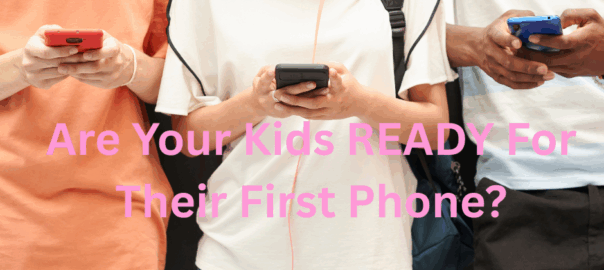Are teenagers safe ‘living’ their lives on-line?
Are teenagers safe, a question every generation of parents has asked for different reasons but this generation faces a new threat.
My daughter exists in the real world. I see her and she interacts. She goes to school and eats occasionally but her life is on-line. On-line is where she feel most comfortable, has her friends and communities. Its where she plays and create friendships.
If we go away she’s communicating on her phone and doesn’t really interact with her new surroundings. She has everything she needs on-line.
I think this is sad but she appears happy enough and I wonder if this the world has just moved on and i should accept it.
Are teenagers safer on-line than in the real world?
She’s a teenager and says she understands the dangers of being on line and can navigate technology better than i can. She often reminds me being in the real world has dangers. The world is a divided and sometimes cruel place. She blocks people she doesn’t like in a way she can’t do in the real world.
Part of me agrees and is glad she isn’t hanging out in our local park/town but as a parent it feels like i’m playing catch up all the time and often i don’t understand her digital world and life.
Online safety and privacy are my top concerns, with cyberbullying, online predators, and data breaches seemingly lurking around every corner. Then there’s the impact of social media on her self-esteem, relationships, and mental health.
Can my child manage her on-line life safely?
My daughter doesn’t appear to suffer from low self esteem or have a shortage or friends, even though they are on-line. She talks to people all over the world and it has opened up new horizons to her. If i ask here where she wants to go on holiday shes says Japan as she has a friend there and likes the culture. I think of young me and i had very little appreciation or knowledge of such a culture. The world is much smaller now.
Opportunities Through The Digital World.
I know there are benefits to the digital world. It presents opportunities for children to connect with others, access educational resources, and develop essential skills. Online learning platforms, educational apps, and social media can provide valuable learning experiences. The new world is digital and she’s definitely embracing it.
How to set boundaries for an on-line life?
I struggle to keep up with the latest trends and technologies, making it difficult to set boundaries and ensure she’s using the internet responsibly. I wouldn’t really know what to do apart from setting a time limit but this is like saying you can’t play with your friends any more.
I’ve spoken to her about the risks Cyber-bullying, digital addiction, and online harassment and she was honest and open about the risks. She’s suffered cyber bullying and harassment and used her on-line friends to judge whats acceptable and what isn’t. Her group act as support as well as moral police.
This worried and saddened me as i didn’t know and wasn’t involved. My judgement wasn’t needed and what was acceptable was determined by friends. May be they are a good group of friends but maybe their all just teenagers finding their way in life but this is learning isn’t it. Did I seek the opinion of my parent when i was a teenager? No I didn’t and lived / learnt by my mistakes. Are teenagers more safe on-line than in the real world because of this support group that exists?
Should i be worried my teenage daughters life is on-line?
I keep coming back to this question and wondering are teenagers safe on-line, in the real world or do threats exist in both.
Should I be worried her life is on-line. She has friends and groups. I hear her laughing and talking one line. She’s been in relationships with people round the other side of the world. she’s not over the park drinking, taking drugs or meeting boys. These all seem positives as i’d rather she was in doors than out late at night. That makes me appear a selfish parent but i can’t help it. i want to keep her safe.
There is the other side where she is on-line talking to bad actors, people who aren’t what they say they are. Don’t have my daughters bets interests at heart and want to exploit her in some way. It feels like where only an on-line step away from something terrible in far worse way than a few drinks over the park and a bad hangover.
How do I Stay Connected To My daughter and her on-line life?
Don’t Dismiss On-Line as not real or relative.
My daughters on-line life is very real and important to her. I’ve learnt and understand this. To her its a real community of people that just communicate and exist on line. To say its not real or not as good as real life connections isn’t relative to her and just demonstrates a lack of understanding. I respect her life and her on-life life and friends.
However much she is on-line she has a real world life as well.
We encourage balance between on-line and real life. An appreciation that she has a real world life as well. We need to connect and communicate. We eat together, have movie nights and do something as a family at least once a week. Bowling, ice skating, something that cannot be done on-line just to anchor her back in the real world.
Time limits.
This is a difficult one as her friends are online. She plays online and this makes her happy. She’s at an age where she isn’t going to spend much time with us anyway so were quite relaxed about time on line. We’ve tried daily limits and they caused heartache. We’ve tried a free for all in the hope she would be bored. Which didn’t really work although she did lose interest eventually.
We set reasonable limits. That we want to to be reasonable about how much time she spends on line and time she spends off line. If she can keep the balance we let her go on line. I know there are all sorts of reasons why we should have strict limits but for us they don’t work.
Real World Activities that will engage her.
We try to promote real world activities. If she wants MacDonalds we don’t just order it and bring it to her we all go out as a family and eat in. We create real world experiences.
We ask what she wants to do and within reason try to do them. We take ourselves out of our comfort zone as she’s coming out of hers.
Go where the Wifi is rubbish.
One i don’t admit to but if i’m booking a holiday and the site / hotel has poor wifi it doesn’t overly worry me. We’ve been on holidays where she’s moaned about the wifi and come out with us in frustratiuon. Either way it works for me and we spend more time together.
Am I Giving In To My Child?
I know it can be seen as giving in by some people and they’d say we should be firmer but they’re not our family. It works for us and we’ve found a balance of sorts. Its not perfect but it works most of the time. We do limit on-line time if we think its getting too much and is having a negative affect on our daughter. that can be traumatic and we get plenty of tears and banging doors, which we don’t want. I’ve got beyond thinking its only on-line to realising its her world.
Every family needs to find what works for them on-line v real world.
The point of this blog is to share our experience and say i’m sure you’re not alone. we have friends with children that are the same. Children that go abroad and spend their time on phones missing technology. As adults we think its sad but its their world.
Would we rather she was out, not telling us where she was and coming home late?
The answer to that is no. I’d rather she was on-line with her friends whoever they may be. The question of are teenagers safe has never been more nuanced. Never been more complicated. The world world appears dangerous. The on line world has hidden evils and dangers. The point is whatever world your in, understanding and knowing the risks and protecting yourself is key but to achieve that you have to make a few mistakes, which has always been a frightening thing for a parent to accept.
Thank you for reading our blog and considering are teenagers safe in our modern, real and on-line world.
The Real and On-Line World are difficult to navigate but there is help available.
CosyChats is a personalised parent support Service that can provide support to parents across a wide range of parenting issues. Including supporting and understanding your child as their worlds go increasingly on line. How you can encourage them to see the benefits of real world relationships and interactions. How an on line and real friendship group can exist together. How maintaining and a strong and open relationship with your child is key to allow communication and that your child can come to you with any question or problem. On-line can be a scary place but so can real world and children need the support and guidance of parents.
For parents of Teenagers click here.
 1-2-1 Personalised Parent Support
1-2-1 Personalised Parent Support Sessions
 Safe Spaces Free From Judgement and Shame
Safe Spaces Free From Judgement and Shame Where No Problem Is Too Big and No Question To Small
Where No Problem Is Too Big and No Question To Small Offering Compassion and Understanding
Offering Compassion and Understanding From Real Parents Who Know How Difficult Being a Parent Can Be
From Real Parents Who Know How Difficult Being a Parent Can Be Real Lived Knowledge & Experience
Real Lived Knowledge & Experience Virtual Sessions Where You Are In Control
Virtual Sessions Where You Are In ControlTop 10 Benefits of the CosyChats service.
👍🏼Access to a wealth of Parenting Experience and Knowledge.
👍🏼Your own personalised 1-2-1 service.
👍🏼A safe space free from judgement and shame.
👍🏼You are in control and choose the CosyChats parent and service that’s right for you.
👍🏼Years of lessons learnt and experience gained that can all be shared.
👍🏼Being understood and your needs heard.
👍🏼No question is too small, no problem too big.
👍🏼Compassion and support from people who understand how difficult being a parent can be.
👍🏼Its affordable and is far greater value than professional providers.
👍🏼Meetings are on online so you can join from where you feel most comfortable.

